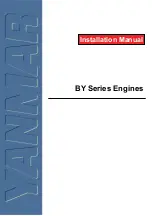
2 - G
ENERAL
I
NFORMATION
18
90-8M0114812 JANUARY 2016
Check safety equipment onboard.
Here are suggestions of the
types of safety equipment to carry when boating:
•
Approved fire extinguisher; paddle or oar.
•
Signal devices: flashlight, rockets or flares, flag and whistle or
horn.
•
Spare propeller, thrust hubs and an appropriate wrench.
•
Tools for necessary minor repairs; first aid kit and book.
•
Anchor, extra anchor line; waterproof storage containers.
•
Manual bilge pump and extra drain plugs; compass and map or
chart of area.
•
Spare operating equipment; batteries, bulbs, fuses, etc.
•
Transistor radio and drinking water.
Know signs of weather change and avoid foul weather and
rough
‑
sea boating.
Tell someone where you are going and when you expect to
return.
Know and obey all nautical rules and laws
of the waterways
. Boat
operators should complete a boating safety course. Courses are
offered in the U.S.A. by:
1. The U.S. Coast Guard Auxiliary
2. The Power Squadron
3. The Red Cross
4. Your state boating law enforcement agency
Direct all inquiries to the Boat U.S. Foundation information number
1‑800‑336‑BOAT (2626).
We strongly recommend that all powerboat operators attend one of
these courses.
You should also review the NMMA Sources of Waterway Information
booklet. It lists regional sources of safety, cruising and local
navigation and is available at no charge by writing to:
Sources of Waterway Information
National Marine Manufacturers Association
410 N. Michigan Avenue
Chicago, IL 60611 U.S.A.
Make sure everyone in the boat is properly seated
. Do not allow
anyone to sit or ride on any part of the boat that was not intended for
such use. This includes the back of seats, gunwales, transom, bow,
decks, raised fishing seats, any rotating fishing seat; or anywhere that
an unexpected acceleration, sudden stopping, unexpected loss of
boat control, or sudden boat movement could cause a person to be
thrown overboard or into the boat.
Never be under the influence of alcohol or drugs while boating (it
is the law)
. Alcohol or drug use impairs your judgment and greatly
reduces your ability to react quickly.
Know your boating area and avoid hazardous locations.
Prepare other boat operators.
Instruct at least one other person
onboard in the basics of starting and operating the power package,
and boat handling, in case the driver becomes disabled or falls
overboard.
Passenger boarding.
Stop the engine whenever passengers are
boarding, unloading, or are near the back (stern) of the boat. Just
shifting the power package into neutral is not sufficient.
Be alert.
The operator of the boat is responsible by law to maintain a
proper lookout by sight and hearing. The operator must have an
unobstructed view particularly to the front. No passengers, load, or
fishing seats should block the operators view when operating the boat
above idle speed.
Summary of Contents for 1550 STERNDRIVE
Page 5: ...ii 90 8M0114812 JANUARY 2016 ...
Page 25: ...2 GENERAL INFORMATION NOTES 20 90 8M0114812 JANUARY 2016 ...
Page 39: ...4 OPERATION NOTES 34 90 8M0114812 JANUARY 2016 ...
Page 43: ...5 CONDITIONS AFFECTING OPERATION NOTES 38 90 8M0114812 JANUARY 2016 ...
Page 69: ...8 OWNER SERVICE ASSISTANCE NOTES 64 90 8M0114812 JANUARY 2016 ...
















































